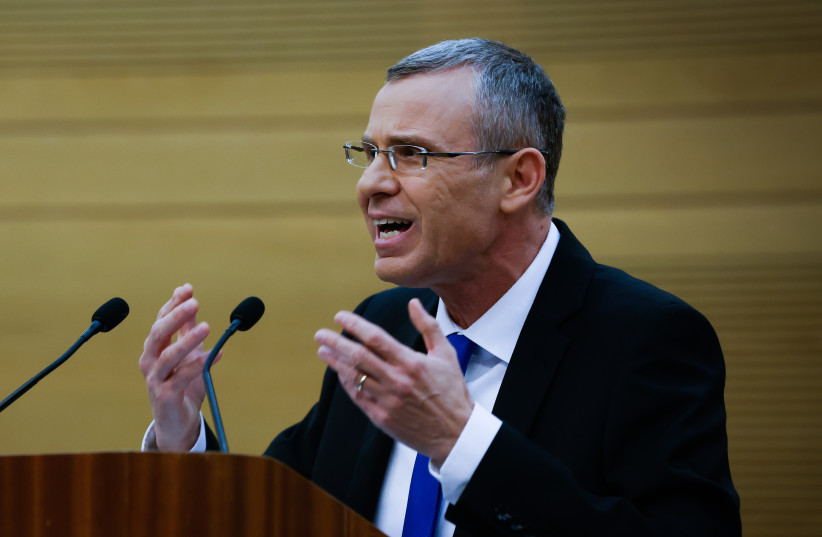"When the cannons roar,” says the old adage, “the Muses are silent.” When the cannons roar, says the coalition, it is impossible to establish a commission of inquiry; it is impossible to hold elections; it is impossible to replace the one who bears the ultimate responsibility. All this can wait until “after the war,” however long it takes. It is also argued that the roar of the cannons demands unity in the ranks. Only one matter has not been put on hold because of the war – the judicial “reform.”
One of the goals of the judicial reform is to politicize the process of appointing judges. However, the justice minister, Yariv Levin, has failed twice: in changing the composition of the Judicial Selection Committee, and in the battle over staffing the committee in its current form. So today, just a third of the committee members support his positions. Therefore, the minister refuses to convene the committee to appoint Supreme Court justices (a month from now, 20% of the court’s 15-seat bench will be vacant) and blocks it from fulfilling its duty, under the Courts Law, to decide on the next Supreme Court president.
A petition was submitted imploring the High Court of Justice to order the minister to convene the committee to elect the president. The justices sought to avoid ruling, but negotiations between the parties failed – with both sides accusing the other of belligerence and inflexibility. Without the High Court’s intervention, when Justice Uzi Vogelman, the acting president of the Supreme Court, retires, the court will be left without a president for the first time. As a result, the High Court was forced to announce that in the absence of agreement, it would rule on the petition soon.
The justice minister contends that the issue is outside the High Court’s authority. But this is a spurious claim; interpreting the law and issuing orders for its enforcement are the core of judicial activity. When a petition is filed, the judges must review it and decide on its merits. If they refrain – the law will become a dead letter.
Another claim is that in the matter of appointing a Supreme Court president, the justices have an inherent conflict of interest, since the decision will directly affect them. Intuitively, this is a convincing argument, but upon further thought, it must be rejected. The justices are not deliberating the election of the president but rather the convening of the committee authorized to do that. The petition requests that the High Court order the justice minister to activate the decision-making mechanism provided for in the law – no more than that.

A legal victory
A LEGAL victory for the petitioners may turn out to be Pyrrhic with respect to public opinion – it is easy to guess the biting reactions aimed at undermining trust in the court – and it is possible that this is what the minister is striving for. But what is the alternative? Should the court allow illegal conduct by a minister, which impedes proper administration, just because he refuses to accept the results of the political process?
These are serious matters: the executive branch wants to decide who will head the judicial branch, through inappropriate use of its powers. Thwarting the election of the leader of the judiciary would diminish its ability to safeguard its authority and independence. This is an assault on the principle of separation of powers; an attempt to realize the objectives of the judicial reform in ways that bypass the Knesset.
This move joins other measures designed to advance the reform “on the ground,” even without a decision in the Knesset. One should remember that the reform aims to hobble the attorney general. It appears that the government is acting determinedly to implement this, and it is not “only” a question of a disdainful attitude toward the attorney general and the attempt to generate hostile public opinion. There is also a deluge of requests from ministers to replace the attorney general with private counsel; an attempt to obtain legal advice from the government secretary instead of the attorney general; and most seriously – an outright negation of her positions.
Thus, for example, in recent days Attorney-General Baharav-Miara ruled that the government must stop subsidizing day care centers for married yeshiva students who are eligible for IDF conscription, but the finance minister declared: “I decide to continue subsidizing the day care centers for yeshiva students.” Further, the attorney general determined that promoting a police officer who is under investigation is illegal, but the minister of national security scoffed: “The appointment... will not be revoked.”
All this comes after nine High Court judges, both conservative and liberal, unanimously determined that “the attorney general is the authorized interpreter of the law for the executive authority, and this interpretation is binding on the executive authority.” There is no escaping the hard truth that certain Israeli government ministers have decided to rebel against the rule of law.
Let it be clearly said: promoting the reform during wartime will reignite social discord in Israel – to the detriment of national resilience, and to the delight of our enemies. Reformers must take it from the muses: Shut up until the cannons stop.
The writer is president of the Jewish People Policy Institute (JPPI) and professor (emeritus) of law at Bar-Ilan University.
